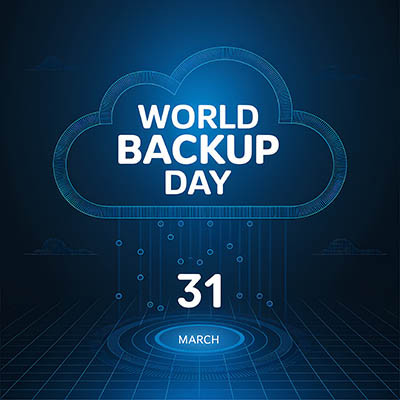Direct Technology Group Blog
World Backup Day Reminds Us How Important Your Backup Strategy Is
It’s World Backup Day! It’s the one day where we bring awareness to the essential process of backing up your organizational and personal data. Let’s go through some of the variables that a comprehensive data backup and recovery plan features to commemorate the “holiday.”
Regular and Automated Backups
Manually backing up data is like remembering to water your plants, it sounds easy, but gets forgotten more than you care to admit. Just like a plant that doesn’t get water, your data continuity strategy dies if you don’t initiate your backups. This is why automation is key.
Schedule frequent backups, daily for critical data, weekly for less vital files. This ensures minimal data loss should something happen. Regularly test these backups to confirm they’re actually working.
Offsite and Cloud Storage
Keeping all your backups in the same location as your main system is like storing all your eggs in one basket. If disaster strikes, everything gets lost. Use cloud storage or an offsite server to protect against local disruptions. Hybrid backup solutions, like our BDR, that combine cloud and physical storage, provide even greater security.
Versioning and Redundancy
Have you ever accidentally deleted a file and wished you could go back in time? Backup versioning allows you to restore previous versions of files instead of just the latest copy. Also, having multiple copies of backups stored in different locations ensures one failure won’t take down your entire system.
Build a Disaster Recovery Plan
A backup is only as good as your ability to restore it. Your plan should outline clear steps for recovering data, restoring systems, and resuming operations. Assign responsibilities to key personnel and establish a communication strategy so everyone knows what to do when disaster strikes.
Cybersecurity Protection
What good is a backup if hackers can corrupt it? Protect your backups with strong encryption, firewalls, and access controls. Ransomware attacks often target backups, so using immutable storage can prevent malicious alterations.
Regular Testing and Updates
You’ll want to run routine tests to make sure backups are retrievable and data is intact. As your business grows, update your plan to accommodate new technology and evolving threats.
Remember, a solid backup plan isn’t just about data; it’s about business continuity. When disaster strikes, you want to be the company that bounces back, not the one that shuts down. By ensuring regular backups, offsite storage, security, and a tested recovery plan, you can keep your business running no matter what comes your way.
If you would like help hashing out your data backup and recovery plan, give us a call today at (954) 739-4700.



Comments